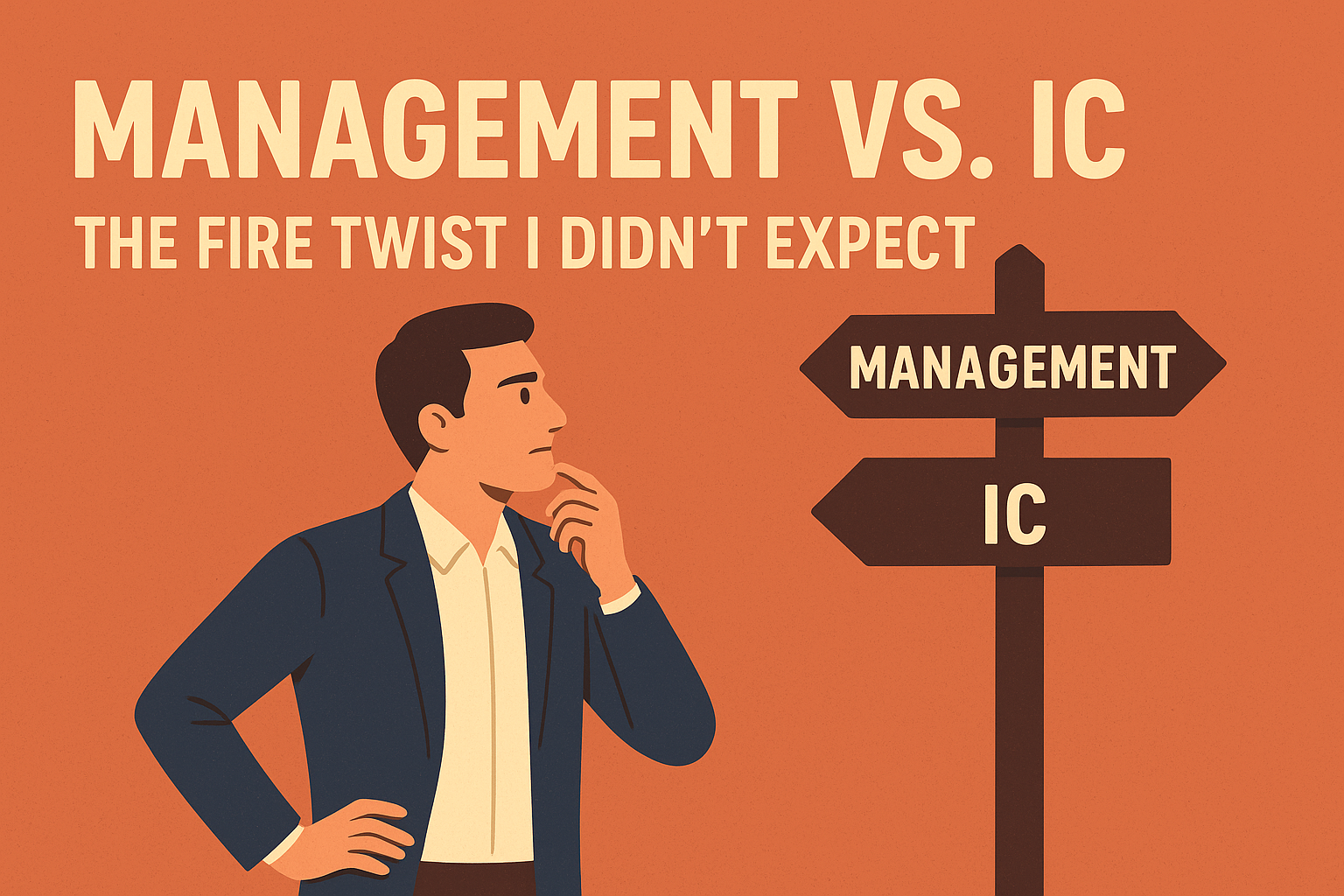Management vs IC: The FIRE Twist I Didn’t Expect
I’ve been a manager for 9 years, a Director for the last 3, running ~45 people across two orgs. By all external measures, I had “made it.” Titles, scope, social recognition, the kind of comp that makes FIRE possible years ahead of schedule.
And yet, lately, I’ve been asking myself: what if I went back to being an IC?
Not because I stalled out. Not because I couldn’t “climb higher.” But because somewhere between chasing FIRE and hitting it—I rediscovered something about myself: I actually love building things.
Let’s break this down through the lenses that always mattered to me: FIRE, money, stress, fulfillment, and recognition.
Are you ready? Standby.

Money: The Myth of Management as the Only Path
Management has paid me well. Director-level comp easily outpaces mid-level IC roles. But once you reach Staff+ or Principal IC, the curves start crossing. Many ICs at that level quietly out-earn managers without inheriting their calendar chaos.
For me, though, money is no longer the decision-maker. I hit my FIRE number 3 years ago, and today I’m $2.7M ahead of my original projection. The financial scoreboard is already won. Which means every dollar I’d squeeze out of another promotion has diminishing utility.
So the real question isn’t “Which path makes more money?” anymore. It’s “Which path makes me excited to wake up?”
Stress: It’s Not Just About Hours
IMO, a manager’s stress is at least 3x heavier than IC stress, even if the hours look similar on paper. It’s not just the meetings—it’s the people escalations, performance issues, org politics, and the responsibility for things outside your control.
However, the more you enjoy the job function, the more bearable the stress becomes. If you hate it, it’s crushing. Some people make terrible managers not because they lack ability, but because they fundamentally dislike the work. That mismatch eats you alive.
IC stress is still real—deadlines, pager duty, deep technical problems—but at least the loop is shorter: see problem, fix problem, move forward.
Fulfillment: Coming Out of “Coding Retirement”
For the last eight months, I’ve poured almost all my nights and weekends into coding again. I even came out of “coding retirement” at work and jumped into a company-wide hackathon. I didn’t type a single line manually—every bit of code was AI-generated.
And I won.
That week was mid-year performance review season, one of the busiest and most draining times for any manager. Yet I found myself juggling both—running two orgs by day, building an app by night. It felt superhuman.
It reminded me of my heyday in engineering, but at a deeper level. With AI, I wasn’t just an engineer again—I was an engineer, designer, and founder all rolled into one. The tools lowered the cost of execution so much that I could wear multiple hats effortlessly. That hit a fulfillment chord I hadn’t felt in years.
Social Recognition: Titles vs. Tangible Impact
Director looks great on LinkedIn. Relatives understand it. Recruiters chase it. But the recognition felt… flat.
I’m now finding more joy in the recognition that comes from shipping something. Launching resellpro.app, pewmatch.com, and pewscores.ai gave me a different kind of validation—seeing hundreds of real users touch something I created.
The world may value “Director” more than “guy who built an AI app,” but for me, the second one is starting to feel more alive.
The FIRE Lens: Quitting to Build, Not to Retire
It’s funny how the world works. FIRE was supposed to get me out of work. Instead, it is giving me the freedom to rediscover the kind of work I actually enjoy.
So now I’m considering something that would’ve sounded insane a few years ago: quitting not to retire, but to build.
AI makes this uniquely possible. The cost of execution is near zero, the iteration cycle is instant, and one person can do the work of ten. It’s creative expression at scale. For me, that’s far more exciting than another promotion.
My Take
There’s a path to money regardless of whether you choose management or IC. By default, I would tell you to pick being a manager whenever you can. Those opportunities are much rarer than the IC ones. But here’s the nuance:
-
If you’re indexing purely on money, and you’re capable of doing both, management gives you more control and visibility over compensation.
-
In the near future, as AI ripples through the world, I believe that the middle management layer will shrink. But the need for great leaders with vision and execution will actually increase.
-
The best hedge is to build toward both skill sets: the craft of an IC and the vision of a leader. That way, you’ll have flexibility no matter where the market goes.
-
Most importantly, know your “enough.” I talk to too many managers, directors, even VPs who feel trapped—unable to leave, unable to pause, stuck in golden handcuffs. To outsiders, they look successful, but they aren’t truly free.
FIRE isn’t about the title, the paycheck, or the social recognition. It’s about having the freedom to choose your path—and to change it when your fulfillment shifts.
And that’s where I am now. Standing at the edge of management, looking back at IC, and realizing that maybe the real reward of FIRE isn’t quitting—it’s choosing what I build next. And that might be a company with an army of AI agents. More to come!
Enjoyed this post?
Subscribe to get my latest posts on financial independence, investing, and the journey to FIRE delivered straight to your inbox.
More Posts

Trump Accounts: Free Money for Your Kids (And How to Maximize It)

5 Things I'm Focused On In 2026

Comments